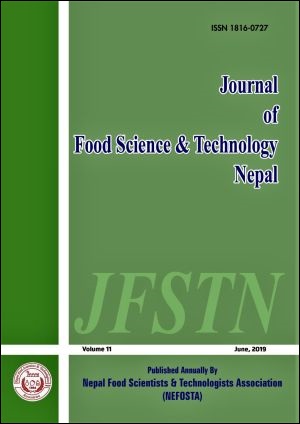Study of Nutritional, Phytochemicals and Functional Properties of Mango Kernel Powder
DOI:
https://doi.org/10.3126/jfstn.v11i0.29708Keywords:
Angle of Repose, Antioxidant Activity, Mango Kernel, Polyphenol, TanninAbstract
Food ingredient with good nutritional and phytochemical properties is always in search. This research was conducted to study the effect of different treatments, namely soaking and blanching, on nutrient, phytochemical, and functional properties of mango kernel powder (MKP). Three treatments were carried out to produce MKP, which were soaking (48 h), heat treatment/blanching (45 °C for 2 min), and control. The seed was cut into four pieces and dried in cabinet drier for 7 h at 60 °C until it becomes brittle. The kernel was ground to pass through a 0.85 mm size sieve. Powder from three treatments was subjected to nutrient analysis, phytochemical analysis, and functional properties evaluation. Crude fat increased significantly (p<0.05) in soaked mango kernel powder, while the treatment decreased total ash, iron, calcium, and phosphorous significantly (p<0.05). Oil absorption capacity (OAC), water absorption capacity (WAC), and wettability of MKP decreased significantly (p<0.05) after treatment, while bulk density increased significantly (p<0.05). The wettability of soaked MKP decreased significantly (p<0.05), while it significantly increased for heated MKP (p<0.05). The heat treatment produced a significant reduction (p<0.05) in ascorbic acid (18.24%), polyphenol content (4.7%), tannin (76.44%), and flavonoid (7.38%) compared to untreated flour while soaking result in a significant reduction (p<0.05) in ascorbic acid (13.1%), polyphenol (3.47%), tannin (63.73%), and flavonoid (21.76%). The antioxidant activity was found to be significantly less (68.33%) in heat-treated MKP compared (p<0.05) to the soaked MKP (79%) and untreated MKP (84.33%). A positive correlation was found between the polyphenol and antioxidant activity. It can be concluded that MKP without treatment can be explored for composite flour as phytochemicals and functional property were found to be better than treated flour.
Downloads
Downloads
Published
How to Cite
Issue
Section
License
The author will be the copyright holder of this open access journal - 'Journal of Food Science and Technology Nepal (JFSTN)'.




